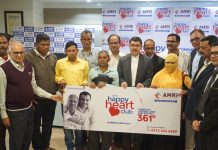Bhubaneswar : Around 150 children from local communities took part in mega-weekend cleaning and tree plantation drives at the villages of Bhubaneswar. The drive was organized recently by SOS Children’s Villages of India (SOSCVI) to spread awareness on forest conservation and environment protection.
The children were members of Bal Panchayats, the forums floated by SOS Children’s Villages of India to give opportunities for children to contribute to the development of their communities, and the cleaning and plantation drives were held on all Sundays of July at their locations of Chhatabar, Binjhagiri, Pitagadia Bhoi, Jamujhari, Dalua, Bhola, Kujimahal, Daspur, Chudang, Krushnanagar and Mahimanagar in Bhubaneswar.
The children cleaned the surroundings of their houses, community centers, anganwadi centers, and school campuses, and planted about 200 trees especially the saplings of mango, jackfruit, papaya, and lemon, there. The children also adhered to Covid-19 guidelines while undertaking these activities.
Mr. Sumanta Kar, Secretary General, SOS Children’s Villages of India, said, “The importance of hygiene and cleanliness, and green cover are evident during the recent healthcare crisis. Involving younger generations for these causes is the responsibility of the society. It is in this context, SOSCVI is organizing cleaning and tree planting activities for children across the country. We are glad to observe that these activities also help children feel free of stress, as they are home bound for a long period of time due to COVID-19. The children had become an inspiration for the elders in the communities, as they too joined hands in many places. The cleaning of the surroundings has also significantly brought down the menace of mosquitoes in the villages.”
It is to be noted that during the recent Paper Bag Day, which falls on July 12 every year, SOSCVI organized events at Jamujhari village in Bhubaneswar to create awareness about adopting paper bags made of 100% biodegradable, reusable and recyclable materials, risks of plastic bags for children and animals, and the livelihood opportunities in making paper bags. Women in the community, trained by the NGO, produce paper bags and sell them to local grocery and variety shops.
-Odisha Age




















